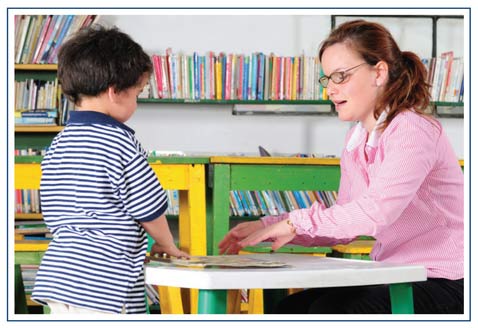
Autism, or Autism Spectrum Disorder, starts in childhood and affects the development of social interaction, communication and behaviour. Autism symptoms range in type, intensity and severity and sometimes can be confused with the symptoms of Attention Deficit Hyperactive Disorder, learning disabilities, and intellectual disabilities. Diagnosis requires a specialized assessment by a psychologist who will determine where the type of autism falls on the autism spectrum, which ranges from mild to severe. Asperger Syndrome and PDD-NOS, which were previously described as less severe forms of autism, have, by diagnosis since 2013, been merged into the classification of autism spectrum disorder.
After autism is diagnosed, it is essential, as early as possible, to provide intensive therapy to maximize the potential of the child or youth. Ideally, intensive therapy is begun by the age of three and provided during the key developmental years of 3 to 7. These behavioural and educational interventions are focused on the needs of the individual. They are based on Applied Behavioural Analysis (ABA) principles, a systematic way of modifying behaviours as part of a learning or treatment process.
PSYCHOLOGICAL ASSESSMENT FOR AUTISM
The psychological assessment determines where the child/youth fall on the Autism Spectrum or whether it is better described by another diagnosis. The Psychological Assessment Report describes the child’s/youth’s behaviour and skills in communication and language development, social skills; daily living skills; education; and unusual and problem behaviours. The Psychological Assessment will also provide guidance on priority skill development areas and the development of an Applied Behaviour Management Program.
The psychologist can also complement the autism assessment with a psycho-educational assessment to assess intellectual capacity and provide guidance on educational needs and programs.
The psychological assessment may be part of the Application process for funding an individualized ABA Program. If the child/youth is diagnosed with autism or an autism spectrum disorder, the child/youth is eligible for Ontario government funding through the Ontario Autism Program. The funded Autism Intervention Program may include ABA or Intensive Behaviour Intervention (IBI) services, psychotherapy, or social learning programs.
BEHAVIOURAL AND SKILLS ASSESSMENTS
This Assessment Process is conducted by a BCBA Clinical Supervisor based on Applied Behaviour Analysis (ABA) which is a field of study that examines the relationship between the environment and behaviour.
Functional Behaviour Assessment

A Functional Behaviour Assessment (FBA) is a process of obtaining information about the function of a behaviour or why a particular problem behaviour occurs. This information informs how to treat the problem behaviour which involves increasing replacement behaviour and decreasing challenging behaviour. The FBA process includes obtaining information through 1) indirect measures such as interviews; 2) direct measures such as observations; and possibly, 3) a functional analysis (FA) or a planned evaluation of what comes before and after the target behaviour.
Some families need an FBA if the child exhibits behaviours that need to be addressed before a Skills Assessment can be conducted and before a Skill Development Program can be provided. In other words, the behaviour of the child doesn’t allow us to accurately determine the skills of the child. The Functional Behaviour Assessment Report details the behaviours needing to be addressed and describes the Behaviour Treatment Program recommended to address those behaviours.
Skills Assessment
All clients need a Skills Assessment to determine the specific skills that need to be developed, and in what order to inform the Skills Learning Program. The Skills Assessment may include Communication, Fine and Gross Motor Skills, Daily Living Skills, Play and Leisure Skills, and School Readiness Skills.
Some examples of Skills Assessment tools that we may utilize are:
- The Assessment of Basic Language & Learning Skills-Revised (ABLLS-R)
- Assessment of Functional Living Skills (AFLS)
- Verbal Behaviour Milestones Assessment & Placement Program (VB-MAPP)
- Essential for Living (EFL)
- Social Skills Checklist
APPLIED BEHAVIOURAL ANALYSIS SERVICES

The ABA services provided depend upon the needs and resources of the family.
Based on the Functional Behavioural Assessment and/or Skills Assessment, the Clinical Supervisor and Senior Therapist determine the child’s/youth’s baseline skill level in language, social skills, play and daily living. They then develop a program to address the individualized and priority needs of the child/youth.
ABA is a one-to-one method of teaching individuals with autism based on the child’s/youth’s unique strengths and needs. It is the only method proven to produce ongoing and lasting progress in children and youth with autism. The teaching systematically addresses communication, social learning, and academic and daily living skills. Progress is monitored and recorded regularly to inform future learning sequences and priorities. IBI is an intense version of ABA therapy that is best provided for 20 to 25 hours a week over two or three years.
If the child/youth has been approved for ABA funding under the Ontario Autism Program the ABA program will be based on the resources provided by the government program. It will usually average between 9 to 20 hours a week.
However, if the family is on the waiting list for government funding, which can be a wait of over three years, or is privately funding the program, the program may be provided for fewer hours a week based on the resources available to the family. Private health insurance may be able to be used to cover a portion of this cost. When government funding is approved, the therapist can continue providing the service at a higher intensity according to the amount of new funds available.
After approval of the program by the family, the therapist will provide ABA on a schedule convenient for the family and client. Therapy is generally provided in the school or home. ABA will focus on such things as decreasing challenging behaviours, receptive and expressive language, social skills, academic skills, daily living and play skills. The program may also include a family instruction component to help parents and other family members assist the child/youth in reaching their goals.
INTENSIVE INDIVIDUALIZED ONE-TO-ONE PROGRAMS
Behavioural Treatment Program
The Functional Behaviour Assessment Report describes and recommends the Behaviour Treatment Program needed to address the problem behaviours of the child or adolescent. The recommended Behaviour Treatment Program will be very specific to the family – it could be long or short in duration, provided in school or home, intensive or less intensive, focused on specific behaviours or more general behaviours. The Program is provided by the Instructor Therapist, under clinical supervision based on need and available resources.
Skills Learning Program
The Skills Learning Program addresses the specific skills that need developmental assistance based on the Skills Assessment. The Program might address a wide range of skills or just a couple depending upon the child’s stage of development. The services are one-to-one services and provided by the IT on site, usually in the home or school. ABA programming, supervision and consultation is provided on a regular basis by the Senior Therapist and the Clinical Supervisor.
The Skills Learning Program is delivered in an intensive One-to-One format using ABA principles. Individualized programs are developed based on the Skills Assessment and designed to be taught in a variety of ways including discrete trial teaching (DTT), Natural Environment Teaching (NET), Pivotal Response Training (PRT), and Verbal Behaviour, etc.
Ongoing progress in skill development is tracked so that updates to the Skills Learning Program are integrated into the treatment process and are provided at no additional cost.
Please contact us for more information about our Autism Assessment, Therapy and Consultation Services. For a complimentary consultation call Quinte Assessment and Treatment Group at 613-966-4262 or email reception@qxplore.com